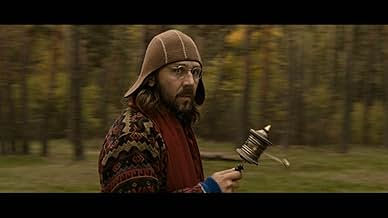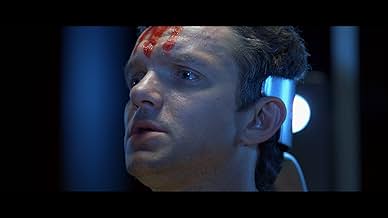IMDb RATING
6.7/10
4.5K
YOUR RATING
A chronicle of the rise of the advertising industry in Post-Soviet Russia.A chronicle of the rise of the advertising industry in Post-Soviet Russia.A chronicle of the rise of the advertising industry in Post-Soviet Russia.
- Director
- Writers
- Stars
- Awards
- 2 wins & 5 nominations total
Andrey Vasilev
- Savin
- (as Andrei V. Vasilyev)
- Director
- Writers
- All cast & crew
- Production, box office & more at IMDbPro
Featured reviews
This movie enchants with its honesty and surprises with its ingenuity. It shows an art-house-like alternative reality, which is an illusion. Unlike art house the movie has a clear message and meaning, you just have to look deeper. The alternative reality is also not really alternative, most of it is Russian reality now. Essentially, if you are a fan of seeing things through the glasses of irony and satire, you are not afraid to wonder what is really going on in the world behind the mask of show and propaganda, the movie is for you. I can't say it's about Russia only; it is a certain view of the world illustrated by the example of Russia. What country doesn't know lost generations, brain-washing and power play? Do not expect to be satisfied. The story leaves much room for thought and conclusions. Pelevin fans would be thrilled, those who didn't read the book will enjoy the movie nonetheless. It would be wrong to compare it to the book, because this is the kind of book that is next to impossible to be screened, yet the director managed to do it with flying colors. Besides, I can hardly think of any Russian movie with so much cursing, which makes the presented reality even more real. Whatever your impressions of the movie, it is definitely worth your time.
I would like to start from the fact that it is one of the rare examples from my experience, when the film version of the book was perceived inseparably from the original, not as an individual work, but as a continuation of the book. It could be either because of the respectful approach of the director Victor Ginzburg towards Pelevin's masterpiece, or because of the comprehensive nature of the book. The fact is that it is nearly impossible to review this movie without considering the original book, that is why this film review will include some observations from the novel as well.
I watched this film after reading the novel and there was no conflict of expectations and reality, to my astonishment. The only thing in the movie that did not match the picture, which came to my mind when I read the novel, is the appearance of the main character (I imagined him as Konstantin Khabensky). In other respects, this film perfectly represented my perception of the novel's events. In accordance with various interviews with the director Victor Ginzburg, this movie was shot independently from big film companies over several years and the financing of the movie was
found by the director himself. It was released in 2011, starring some of the big names of Russian film industry, and received mixed reviews from critics. Despite my perception of the novel and film, the plot of the movie has some major differences from the novel in terms of the plot and the message. However my review will be focused on the subject of the altered state of consciousness of the main character and how it affects his and the audience perception of reality. In my opinion, the director and, especially, the director of cinematography and editor did the great job
in delivering this atmosphere of the novel to the screen.
It can be assumed that the perspective of Vavilen Tatarsky, the main character of the film played by Vladimir Epifantsev, plays a huge role in this movie. What I mean by his "his perspective" is the situations and events of the book and described moments in Russia's history in "his eyes", how Vavilen sees and perceives it. It affects the mood, plot development and subject matter of the film. For example, the audience can view the beginning of the 1990s as
something interesting and curious, despite some hardships (audience and readers can feel it from the way he describes the market, where he worked as a cashier, where the whole difference of people occurs). Readers/audience's perspective is affected by Vavilen's state of mind, and Vavilen's mind, in its turn, is affected, first of all, by historical events of 1990s' Russia, and,
secondly, the type of drugs Vavilen takes throughout the movie. It also could be paraphrased, that Vavilen's perception of the historical reality of 1990s Russia is affected by his active drug use. For the first example, the audience can see that the majority of the film/book Vavilen actively uses cocaine, which stimulates the brain, mental effects of which may include an "intense feeling of happiness, loss of contact with reality, or agitation". It can be assumed that his glamorous perception
of the advertising business and his "flashy", sometimes controversial advertisement lines can be influenced by his constant cocaine usage. The editing of the movie from the beginning to the middle of the movie can be described as fast, the scenes replace each other and the years of Vavilen's life and Russia's history are delivered in the matter of minutes of the film. However, some scenes, which take longer than usual, deliver just couple of days of Vavilen's, and in those scenes Vavilen either sober, or taking psychedelic drugs, such as LSD or mushrooms, which are given to him by the weird characters such as his old classmate, played by Shnurov or some stranger in the bar. By its nature, psychedelics do not cause happiness, but allow us to view
things from different points of view and see hallucinations. All the "weirdest" scenes, where he sees Babel or interacts with Che Guevara, are the ones where Vavilen takes psychedelics.
Director perfectly delivers this atmosphere with the help of special computer effects. However, in my opinion, it is not drugs that cause these scenes, but Pelevin's mind, and the reason why he added all these drugs may be to make these crazy things be justified by the audience like me and perceive his thoughts as normal.
It can be concluded that here perspective does matter to view the character and his
personality, but it does not affect the message of the book.
This film beautifully tells the tale of an advertising copy writer as he rises up in the world of Russian Busness. This film is so well done that it borders on an "Art" film and the story is both intriguing and disturbing for the viewer because the mechanisms shown fully exist in the world we live in, and this is a "glimpse behind the curtain" of that dark and relatively unseen world. Filmed with High production values the film showcases that indeed Russians are not only capable of making great movies but, that they can be done in a way that is every bit as entertaining and sophisticated as Hollywood. A remarkably worthwhile watch even with the subtitles. The story will provoke thought long after the film has been watched. Highly recommend for folks that like intellectual storytelling!
One of the best post-modern russian movies, there are not much though. Soundtrack is great, characters are too.
First of all, I would like to express my admiration. Admiration for the fact that the creators managed to make a good film with a clear plot, excellent acting, pleasant pictures, high-quality and appropriate special effects, with humor and meaning. There is no vulgarity here, the swearing does not spoil the impression - it is appropriate. And this (good cinema) is in itself a huge achievement.
I was afraid that with such an abundance of stars it would simply turn out to be another skit, but no: everyone played their roles well. I would especially like to mention Efremov: I don't even remember him in a role that lasted more than a couple of minutes and without a bottle. Here, he is both a habitual tyrant, an evil genius, and a victim.
And of course the main star of the film is Epifantsev. From the very beginning I didn't like the fact that he would play Babylen, but he is so organic in this role that any objections disappear from the very first scene. He is simply perfect for the role of a young, energetic man who does not believe in anything, trying to survive in a destroyed country during the troubled times.
I was afraid that with such an abundance of stars it would simply turn out to be another skit, but no: everyone played their roles well. I would especially like to mention Efremov: I don't even remember him in a role that lasted more than a couple of minutes and without a bottle. Here, he is both a habitual tyrant, an evil genius, and a victim.
And of course the main star of the film is Epifantsev. From the very beginning I didn't like the fact that he would play Babylen, but he is so organic in this role that any objections disappear from the very first scene. He is simply perfect for the role of a young, energetic man who does not believe in anything, trying to survive in a destroyed country during the troubled times.
Did you know
- TriviaKonstantin Khabensky turned down the role of Babylen Tatarsky. Than it went with Vladimir Epifantsev.
- GoofsIn the opening scene depicting the late 1980s USSR a street musician is holding a cordless microphone - an incredibly expensive piece of equipment at that time. Even popular Soviet musicians, gathering stadium sized audiences complained they couldn't afford them.
- ConnectionsReferenced in kuji: Lado Kvataniya: The Idea of a Cinema (2024)
- How long is Generation P?Powered by Alexa
Details
- Release date
- Countries of origin
- Official sites
- Language
- Also known as
- Generation P
- Production companies
- See more company credits at IMDbPro
Box office
- Budget
- $7,000,000 (estimated)
- Gross worldwide
- $4,664,538
- Runtime1 hour 52 minutes
- Color
- Sound mix
- Aspect ratio
- 2.35 : 1
Contribute to this page
Suggest an edit or add missing content
































